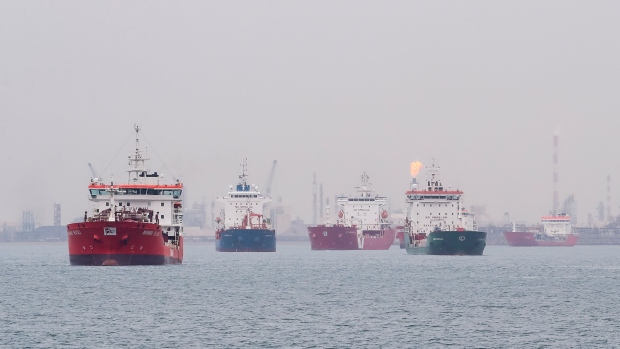Apr 12, 2024
Russia’s Backlog of Stranded Sokol Crude Is Almost All Gone
, Bloomberg News

(Bloomberg) -- The backlog of Russian Sokol crude that got stranded after Indian refiners stopped accepting the cargoes in December has dwindled to just two million barrels, down from a peak of more than 18 million in mid-February. It may soon clear completely.
About half of the oil that accumulated in tankers anchored off Singapore and Yeosu in South Korea has been discharged at ports in China since Russia succeeded in lining up alternative buyers in mid-February, vessel-tracking data monitored by Bloomberg show.
Some cargoes eventually found their way back to India, in several cases being transferred onto different tankers in order to complete delivery. Almost six million barrels, about one-third of the total, have made it to the country’s refineries.
What changed is that Sokol is now being supplied by traders, rather than the Russian producer, and the cargoes are offered at attractive discounts, according to refinery executives who asked not to be identified as the information is private. Russia’s oil industry has been subjected to a range of international sanctions since Moscow’s invasion of Ukraine more than two years ago.
There are now just two tankers holding the remaining stranded barrels, and they may not be on board for much longer. A third is moored off Pakistan and is already discharging its cargo, the data show.
About 730,000 barrels are being held in the Nireta, currently anchored off the port of Visakhapatnam on India’s east coast, where Hindustan Petroleum Corp. Ltd has a refinery. The ship has been there since the start of the month. The remaining 1.4 million barrels are on the La Balena, which is making its way toward Singapore from the waters between South Korea and Japan, where it had been since early January.
The Aframax tanker Clyde Noble began offloading its cargo of about 730,000 barrels at the Byco Petroleum Pakistan Ltd. refinery west of Karachi. That’s the second cargo of stranded Sokol crude to be discharged there.
Pakistan has also received about 600,00 barrels of Russia’s Urals crude from the Black Sea this year. The three deliveries make the Asian nation the fourth-largest buyer of Russian crude so far in 2024, the tracking data show. But it’s a long way behind China, India and Turkey, with its purchases accounting for less than 1% of Russian seaborne crude exports since January.
- READ: Russia’s Crude Exports Fall Back as Flows From the Baltic Shrink
--With assistance from Rakesh Sharma.
©2024 Bloomberg L.P.






